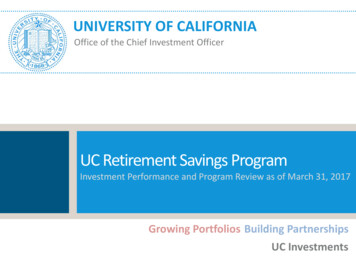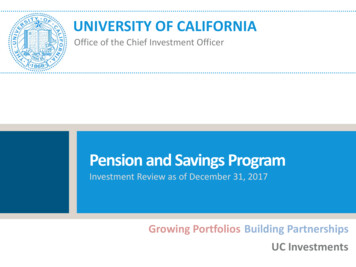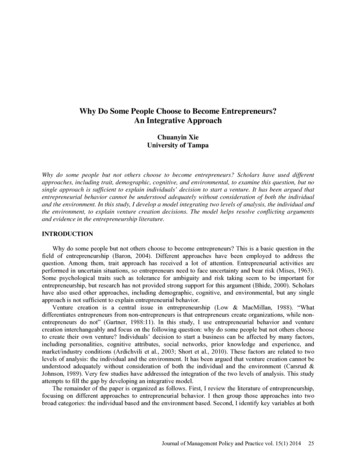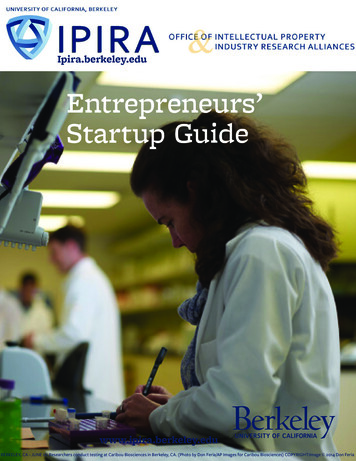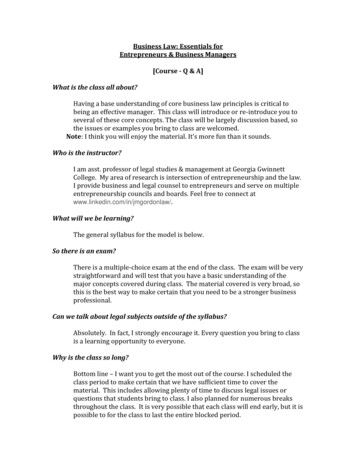
Transcription
Small Business and Entrepreneurs PathwayThis pathway includes: Understanding how small business builds local economies Building training and programs to support local small businesses Connecting patrons with resources for small business development and sustainability.Why is it important?Starting new local businesses or sustaining existing small business is a viable way to create jobs andstimulate the local economy, especially in communities where job opportunities continue to be scarce.Libraries can be productive partners in supporting local economic development.Small BusinessDiscovery &AssessmentCollectionsTraining &ProgrammingCollaborationCommunicationThis pathway is online at: rces/materials.html.Links to all resources are listed in the URL Reference List at the end of this document.The online version has embedded hyperlinks to resources.
Small Business and Entrepreneurs PathwayCase Study: The Fairfield Public Library Means BusinessAfter building a successful program for job seekers at the Fairfield (CT) Public Library, Judy Sparzofocused the spotlight of her innovative energy on how her library could support small business andentrepreneurs in the community.Discovery: know your communityFairfield, Connecticut, has a high percentage of highly skilled, white collar professionals who weresurprised to find themselves suddenly jobless as the economy plummeted. Sparzo recognized that thisdemographic was ripe to become their own bosses. She wanted to transition them to thinking aboutstarting their own businesses. She also guessed that there were small community business people whowere foundering in the recession but did not know they could find help at the library.Collection: ready for businessThe Fairfield Public Library was fortunate to have a basic set of books, periodicals and databasesto provide important information for local entrepreneurs. Most of the reference staff are not trainedspecifically as business librarians but they are experienced and confident in their strong reference skillsand their ability to locate requested information.These three databases top the list for usefulness: Reference USA—an online directory of over 14 million U.S. businesses that can be sorted bygeography, size and type of business Business and Company Resource Center—company profiles, industry rankings, products andbrands, stock prices, investment reports, industry statistics Dunn’s Million Dollar Database—premier directory of all U.S. public and private companies with salesof at least 1 million or at least 20 employees; excellent source for biographies of company officers.Collaboration: finding partnersAlthough it may seem like putting the cart before the horse, when developing programs to supportentrepreneurs, it makes sense to start by first identifying partners in your community. The partnersthe library finds to work with will help to shape the type and the scope of the services to offer. Makingconnections with experts who can provide training and programming can compensate for the library’s lackof a business or financial reference specialist.Sparzo turned to the local office of SCORE, a national organization that bills itself as “America’s premiersource of free and confidential small business advice for entrepreneurs.” In that first connection, theSCORE representative brainstormed some starter topics, which became the basis of the first workshopseries. He also recommended a host of speakers, all of whom had already been vetted by theirorganization for quality.Once the Small Business Strategies program was rolling, it became easier to find other interestedpartners. Sparzo’s value proposition leverages the connection with SCORE and its e-mail promotion listof several thousand clients, and highlights the program’s success in reaching current and prospectiveentrepreneurs.Programs: build on what worksIf you’ve got a successful formula, why not see if it applies to other efforts? That’s exactly what Sparzodid—she started with the workshop series format that had worked so well for the job seekers workshops.With the help of her SCORE partner, she identified topics and contacted speakers. The timing of theprogram schedule was carefully selected to reach the intended audience. The 7 PM weekday eveningstart time has worked well for most small business people, where a Saturday morning program wouldexclude too many current business owners.
Small Business and Entrepreneurs PathwayIn the first two seasons of the Small Business Strategies programs, the hot topics (those with the highestattendance) were: Creating a business plan E-mail marketing Using LinkedIn to promote your business Online marketing with social media Search engine optimization.Communication: go meet your neighborhood business peopleSparzo printed brochures for the Small Business Strategies series, which was the only notable expensein the development of the program. The brochures, which were distributed to key community locations,list not only the workshop topics in the series, but also the services and resources the library has tosupport small business. Press releases were sent to more than 20 online, print, radio and television mediacontacts. Additionally, word-of-mouth marketing was deployed. One Fairfield librarian hand-deliveredbrochures to many local businesses, talking personally to the owners in the process.Outcomes: voting with their feetRight from the beginning, attendance at the Small Business Strategies series indicated that Sparzo hadguessed correctly about the untapped need in the community. The 11 workshops offered in the first twoseasons (fall and winter 2010) attracted 496 attendees. During the same period, the library’s 14 jobseeker programs had 497 attendees. The Power of E-mail Marketing program had 91 people, which is themost ever for a Fairfield library program.Feedback from attendees affirmed that the series was extremely helpful. Not only did they receivevaluable information, but they also had opportunities to interact individually with presenters from thebusiness community and to network with fellow entrepreneurs.Read the full story; in addition, podcasts are available for several of the workshops.Rules of the roadChristine Hamilton-Pennell has written and taught widely about the powerful connection betweenlibraries and their local small business communities. She offers these “rules of the road” for any librarythat embarks on this pathway:1. Get out and listen!2. Meet business people and providers on their turf.3. Track and monitor your efforts: what works and why.4. If something doesn’t work, try something else!5. If you have basic research skills, you can answer most business questions.6. If you understand a few basic business research needs (competitor, customer, market andindustry information), you will be able to help the majority of business owners.7. Practice makes perfect—go for it!8. Personal connections and networks are best way to promote your business services (and library).9. Assume that you are invited to the table and everyone wants to partner with you.10. Don’t be afraid to ask—the worst that can happen is someone says, “No.”
Small Business and Entrepreneurs PathwayDiscovery & AssessmentResources and ideas to help you take actionFocus here to learn more about:Consider: The needs of your local business community Are you able to articulate small business needs to potentialpartners? How libraries can support small business contributions toworkforce recovery Local, state or national agencies available to providesupport for local small business.ÖÖ Look at Collaboration Are you able to articulate small business needs to keycommunity stakeholders?ÖÖ Look at CommunicationWhat do you know about the needs of the local business community?I understand how small business contributes to the strength Economic Gardening Overview gives a brief summary ofof the local economy.the concept of economic gardening and the potential role oflibraries to support it. Growing Local Economies is the website created byChristine Hamilton-Pennell, a librarian with expertise ineconomic gardening concepts and practices.What can your library do to support local small business?I know how libraries can support local entrepreneurs andthe development of small businesses.I know what my library has already done to support localbusiness.I can identify at least one way that my library can increaseits support. Read Public Libraries and Community EconomicDevelopment: Partnering for Success, a report aboutthe role that public libraries can play in supporting localeconomic development. Read 25 Ways Your Library Can Support the SmallBusiness Community. Listen to the webinar archive of How to Make Your LibraryEntrepreneur-Friendly, webinar #1 in the Libraries andEconomic Development series, which covers basic ideasand strategies. Get out in the community and find out what localbusinesses need and want, and show that the library caneffectively meet that need.How can your library help patrons discover entrepreneurship?I encourage patrons to consider the possibilities of startinga business. Create an “entrepreneurship test” handout based on this listof qualities it takes to be an entrepreneur.I help patrons understand what it takes to be anentrepreneur. Use the SBA Small Business Readiness AssessmentTool to help your patrons determine if they are ready tostart their own business. Develop a “Small Business Resource Center”; include aprint collection, computers dedicated for small businessusers, and other equipment like printer or scanner.What local, state or national agencies are available to provide support for local small business?I am able to connect patrons with state and local agenciesand organizations that provide support for entrepreneursand small business.Start with national agencies that may have local offices: U.S Small Business Administration (SBA.gov) has localoffices across the country. SCORE is a nonprofit organization that offers free help andadvice. Small Business Development Center (SBDCNet.org) has alocal SBDC locator. Find out if your state economic development or secretary ofstate offices offer a free small business start-up kit.
Small Business and Entrepreneurs PathwayDiscovery & Assessment (cont.)Resources and ideas to help you take actionWhat can library staff do to better prepare to help entrepreneurs?Staff at my library understand that helping entrepreneurs issimilar to fulfilling the information needs of other patrons. Help staff understand that business owners’ needs fall intoa few key categories—marketing, competition, industrytrends and demographics. Assure staff that if they have basic research skills, they cananswer most business questions. Have staff form a study group to explore and learn from aresource like the RUSA Selected Core Resources.CollectionsResources and ideas to help you take actionFocus here to:Consider: Identify what your library collection has to serve smallbusiness development and sustainability Does your collection align with assessed small businessneeds? Identify what you need to begin or augment a collection tosupport local small businesses.ÖÖ Look at Discovery & Assessment Who can you collaborate with to share resources?ÖÖ Look at CollaborationWhat do you need to begin or augment a collection to support local small business?My library has a basic business collection of print andonline resources. Consult the Library of Congress list of basic businesscollection materials to identify the basics of a businesscollection.I use existing resource guides and pathfinders. RUSA (Reference & User Services Association) has acomprehensive Libguide of resources for Starting a SmallBusiness.I have adapted the resource guides and pathfinders tomeet local needs.My library has developed an online directory to a list ofwebsites that answer business questions, including how tosecure funding.My library website has a link to the state library (or otherrelevant library) small business resource section. Small Business: Step by Step is a user-friendly website tohelp people start a small business. Examples of state and public library small businessresource directories:–– Dallas Public Library Starting a Small Business–– WorkSC (State Library of South Carolina) Start yourown business–– Burlington County Library System Business Gateway–– The small and rural Farmington Area (IL) Public Libraryhas a section on Economic Development Resources.I know what databases my library has to supportentrepreneurs.I understand how to use common databases to supportentrepreneurs.If my library doesn’t have adequate business databases, Iam able to network with other libraries to share databaseaccess. Listen to Turning Your Databases into Business for YourCustomers (webinar #2 in Libraries and EconomicDevelopment series), to learn about resource options forsmall and large libraries. Manta.com is a free source of information on smallcompanies, helping business professionals promote theirbusiness and make connections. Databases (for fee) commonly held by libraries for businessreference:–– Reference USA–– BusinessDecision–– Hoover’s Lead Builder.
Small Business and Entrepreneurs PathwayTraining & ProgrammingResources and ideas to help you take actionFocus here to:Consider: Identify available self-paced training resources forentrepreneurs Do your training/programming plans align with assessedsmall business needs? Identify programs and classes your library could offer tobuild skills and knowledge for entrepreneurs and smallbusiness.ÖÖ Look at Discovery & Assessment Do you have the collection you need to support training andprograms for small business and entrepreneurs?ÖÖ Look at Collections Who can you collaborate with to deliver training andprograms?ÖÖ Look at Collaboration Do you have plans for effective marketing of your trainingand programs?ÖÖ Look at CommunicationWhat programs or classes can my library offer to build skills and knowledge for entrepreneurs and small business?I connect patrons to free, good quality offerings forself-directed online training on topics of interest toentrepreneurs. See the SBA’s Online Small Business Training. BizLaunch offers free webinars for entrepreneurs. The IRS offers a virtual small business tax workshop. How-To Guides for Small Business on a range ofpertinent topics from the Wall Street Journal.I am aware of what programs and services other librariesprovide for entrepreneurs.I can identify at least one program idea that we could offerat my library.I can adapt and use existing curriculum for entrepreneurclasses and programs. The Small Business Notes site describes a variety ofprograms and services offered by public libraries, includingthe Power Up program at Brooklyn Public Library, whichprovides help for business start-ups. Look for ideas in the events calendar for the New YorkPublic Library’s small business resource center. Boulder (CO) Public Library regularly offers a Business101 class to train aspiring entrepreneurs how to use thelibrary resources for business research. The Fast Forward program at the New Mexico State Libraryshares the curriculum for its Small Business Successseries.What programs and services could my library offer that connect entrepreneurs to new ideas and opportunities?I am able to research and connect entrepreneurs to newideas and opportunities. Follow entrepreneurial blogs like Small Business Trends. Share the tips in How To Market A StartUp With SocialMedia or develop a class on the topic. Find a successful Etsy.com entrepreneur to giveworkshops on how to use the online marketplace. Research new developments in small business andconnect entrepreneurs to efforts like Kiva, which hasbrought Microlending Home to the U.S., or PieLab.
Small Business and Entrepreneurs PathwayTraining & Programming (cont.)Resources and ideas to help you take actionI inform entrepreneurs about the use of social networkingand an online presence for small businesses. Entrepreneur Connect is an online networking site forbusiness people; membership is free.I am able to plan a networking event, or series of events, atmy library to facilitate peer knowledge exchange. Other social networks available to business owners:LinkedIn, Meet the Boss and Partner Up. See a list of the Best Blogs for young entrepreneurs. Small Business Trends offers this list of videos for smallbusiness, including how to use YouTube, LinkedIn andother social media tools. The Johnson County (KS) Library holds an annual GovFestfor Entrepreneurs to connect them with governmentand nonprofit agencies that can help; check out the list ofparticipating agencies for ideas.CollaborationResources and ideas to help you take actionFocus here to:Consider: Identify strategic community connections and potentialpartners Are these partners able to help the library augment itscollections? Build relationships and develop partnerships withcommunity-based agencies to augment services andprovide programs for small business.ÖÖ Look at Collections Are these partners able to help the library communicate itsvalue to the community?ÖÖ Look at CommunicationHow do I build relationships and develop partnerships with community-based agencies to augment services and provideprograms for small business?(For general information, see the Partnership andCollaboration Guide.)I connect with business entities in the community.I identify and connect with regional, state or federalopportunities to support entrepreneurs and small business. Attend local business meetings and volunteer to serve oncommittees. Attend meetings and events of entrepreneurship groups orinventors clubs. Have a library booth at community events for “powernetworking” with potential partners; let the businesscommunity know what services the library provides forthem. South Central Michigan Works is an alliance of nineorganizations, including the library, that have come togetherto coordinate services they provide to small businessentrepreneurs. SBA Project in Illinois describes a statewide effortin Illinois to expand access for small businesses andentrepreneurs in 66 public libraries.
Small Business and Entrepreneurs PathwayWhere do I find potential partners to collaborate on programs for entrepreneurs?I have identified appropriate partners to augment thelibrary’s support of entrepreneurs. Find the local offices of: SBA, SBDC, SCORE, Chamberof Commerce.Business librarian Christine Hamilton-Pennell suggests theseother partners for small business collaboration.Typical business-related partners: Economic development organizations Civic and social groups such as Rotary and Kiwanis Workforce centers Universities, community colleges, continuing education andtraining programs Financial institutions such as banks and credit unions Professional business associations and groupsOther potential partners (think outside the box!): Community foundations and loan funds Utility companies (many have economic developmentdepartments and funds) City/county governments and elected officials Entrepreneurs and inventors groups Nonprofit organizations (arts and cultural entities) Healthcare agencies Tourism offices Senior centers Youth entrepreneur programs (Scouts, 4-H) Technology organizations Venture capital and angel investors Incubators and technology transfer programs Microfinance organizations Churches and other religious institutions Recreation and sports organizations Professionals who serve small businesses (lawyers,accountants, financial advisors, designers and marketingprofessionals).I have identified and approached appropriate partners toimplement programs and projects. Carson City (NV) librarians helping city regain itseconomic mojo describes a library program that focuseson the needs of startup and growth businesses. Glen Carbon (IL) Centennial Library (LJ’s Best SmallLibrary in 2010) partnered with the Glen Carbon Chamberof Commerce to provide educational programs and aBusiness After Hours program for local businesses. Find local successful small business owners to givepresentations at the library. Find local community college offerings of classes onstarting a small business; instructors may be willing todeliver seminars at the library. Engage volunteers from SCORE to deliver programs orprovide 1:1 help for patrons at the library.
Small Business and Entrepreneurs PathwayHow does the library address the possibility of self-promotion by business collaborators?There are policies in place that define the acceptable levelof promotion by partners from the business community. Form partnerships with business entities that are local tothe town or region, rather than large national chains. Develop a policy and tell commercial presenters up frontthat they may not sell or promote their businesses in anyway during their presentations. Some libraries allow presenters to leave business cardsand brochures for their audiences; others do not allow it.CommunicationResources and ideas to help you take actionFocus here to learn more about:Consider: Marketing the library’s services to small business andentrepreneurs Are you able to engage partners to help with promotion ofservices or communication of value? Communicating the value of the library’s support foreconomic recovery to community stakeholders.ÖÖ Look at CollaborationHow do I let the business community know about the resources and services the library has to support them?(For general information on effective communication, see theGetting the Word Out Guide.)I know ideas and strategies for marketing and outreach tothe small business community. Going to Your Customer (webinar #3 in the Libraries andEconomic Development series) addresses outreach tothe business community. Create a bookmark with quick reference information on thestate and local forms required to start a new business. Create a Small Business Start-up Backpack.I am able to communicate the value of the library asessential for the development of the local economy. Public Libraries and Community EconomicDevelopment: Partnering for Success makes a case forpublic libraries’ contributions to the business communityand economic development. Capture testimonials from small business patrons (withpermission to use them) and convey these successes tostakeholders. Develop library advocates among small businesscommunity leaders.
Small Business and Entrepreneurs PathwayURL Reference ListLinks to resources are listed below in the order they appear in this pathway.The online version has embedded hyperlinks to resources.Case StudyJudy ersSparzo.cspSmall Business Strategies series: ness.pdfFairfield Public Library full story:www.webjunction.org/documents/wj/The Fairfield 040 CT 041 Public Library Means Business.htmlJobs and Small Business series ine Hamilton-Pennell: http://growinglocaleconomies.com/aboutDiscovery & AssessmentEconomic Gardening overview:www.webjunction.org/documents/wj/Economic Gardening libraries help to grow local economies.htmlGrowing Local Economies: http://growinglocaleconomies.com/Public Libraries and Community Economic Development: Partnering for Success:www.iira.org/pubs/publications/IIRA RRR 688.pdf25 Ways Your Library Can Support the Small Business Community:www.webjunction.org/documents/wj/25 Ways Your Library Can Support the Small Business Community.htmlLibraries and Economic Development webinar series:www.webjunction.org/events/wj/Libraries and Economic Development Series.htmlEntrepreneur es-the-entrepreneur-test-for-the-rest-of-usSBA Small Business Readiness Assessment Tool: http://web.sba.gov/sbtn/sbat/index.cfm?Tool 4U.S Small Business Administration: www.sba.gov/SCORE: www.score.orgSmall Business Development Center: http://sbdcnet.org/RUSA Selected Core ciesbusiness.cfmCollectionsLibrary of Congress business collection materials: www.loc.gov/rr/business/index1.htmlRUSA Starting a Small Business: http://brass.libguides.com/content.php?pid 112731&sid 849146Small Business: Step by Step: www.starting-a-smallbusiness.com/Dallas Public Library Starting a Small Business: SC Start your own business: www.worksc.org/start-your-own-businessBurlington County Library System Business Gateway: http://explore.bcls.lib.nj.us/businessFarmington Area (IL) Public Library Economic Development lopment/economic development.htmLibraries and Economic Development webinar series:www.webjunction.org/events/wj/Libraries and Economic Development Series.htmlManta.com: www.manta.com/Reference USA: www.referenceusa.com/BusinessDecision: www.businessdecision.info/Hoover’s Lead Builder: www.hoovers.com/leads/build-a-list
Small Business and Entrepreneurs PathwayTraining & ProgrammingSBA’s Online Small Business gBizLaunch: www.bizlaunch.com/IRS virtual small business tax workshop: www.irsvideos.gov/virtualworkshop/How-To Guides for Small Business: http://guides.wsj.com/small-business/Small Business Notes: lic-libraries.htmlBrooklyn Public Library Power Up program: r-local-library.htmlNew York Public Library’s small business resource center: www.nypl.org/smallbizBoulder (CO) Public Library Business 101: http://research.boulderlibrary.org/content.php?pid 29613&sid 216568Small Business Trends: http://smallbiztrends.com/How to Market a StartUp with Social tion/how-to-market-startup-social-media/Etsy.com: www.etsy.com/sell?ref so sellKiva Brings Microlending Home to the : l? r 2Entrepreneur Connect: http://econnect.entrepreneur.com/Social networks:LinkedIn: www.linkedin.com/Meet the Boss: www.meettheboss.com/Partner Up: www.partnerup.com/Best Blogs for young entrepreneurs: 50-blogs-for-young-entrepreneursSmall Business Trends videos: videosJohnson County (KS) Library GovFest for Entrepreneurs: www.jocolibrary.org/default.aspx?id 17548&epslanguage ENCollaborationSouth Central Michigan Works: www.scmw.org/about/partners.htmlIllinois Public Libraries Providing Access to Small Businesses and Entrepreneurs:www.webjunction.org/documents/wj/SBA Project in Illinois.htmlCarson City (NV) librarians helping city regain its economic mojo:www.nnbw.com/ArticleRead.aspx?storyID 16577Glen Carbon Centennial Library Best Small Library 2010: nicationLibraries and Economic Development webinar series:www.webjunction.org/events/wj/Libraries and Economic Development Series.htmlSmall Business Start-up Backpack:www.webjunction.org/documents/wj/Small Business Start up Backpack.htmlPublic Libraries and Community Economic Development: Partnering for Success:www.iira.org/pubs/publications/IIRA RRR 688.pdfAll Project Compass programs and materials are made possible by a grant from the Institute of Museumand Library Services, and provided by WebJunction and the State Library of North Carolina.
Tool to help your patrons determine if they are ready to start their own business. Develop a “Small Business Resource Center”; include a print collection, computers dedicated for small business users, and other equipment like printer or scanner. What local, state or national agen
